
Stéphanie Bodet recently featured in the video "Of the Rock I asked for the Moon", balancing her way up a delicate slab and eloquently describing the evolution of her climbing career through the narration of a text which she had written. Stéphanie's philosophy on life is intricately linked to and influenced by 20 years of climbing adventures, which she has experienced all over the world in a variety of forms - whether in world-cup competitions or on hard sport, trad, alpine and big-wall routes. Alongside husband Arnaud Petit, she has lived a life in the mountains which has enriched her life as a whole.
In a world increasingly centred around achievement, fame and commercialism, the microcosm of climbing is vulnerable to these exterior influences, yet Stéphanie's narration appeared to focus on returning to the pure enjoyment of climbing - doing it for the sake of it, for the love of it, and for some - for what it can teach us about ourselves and our perspective on life.
I asked Stéphanie some questions to find out more about the video and her 'climbing philosophy.'
"Climbing allows you to travel, to enrich yourself through meeting others and to learn to know yourself better. On this level, yes - it’s a philosophy of life for me."
Interview translated from the original French text by Natalie Berry
How did you discover climbing?
I started climbing on the cliffs of Ceüse at age 14, with the Club Alpin Français in Gap. At the time I didn’t really realise how privileged I was to start climbing there! After that I didn’t stop. In the beginning my views were quite old-fashioned: I wanted to be at ease on rock to be at ease in the mountains, but eventually rock climbing itself took priority. As I have had asthma since childhood, climbing did me good as the physical effort - not too long in duration - was well suited to my condition. My endurance was rubbish, but thankfully my parents had always taken me for walks in the mountains or on ski-tours - despite my poor health - and I had built my fitness up over the years.
What was it about climbing that attracted you?
What I liked, I think, was that climbing didn’t really seem like a sport. I was pretty much allergic to all traditional sports, in which I wasn’t especially gifted. Most of all I enjoyed being in nature with friends. In climbing, I immediately felt in my element. There was the contact with the rock, the searching and finding of your own solutions to get higher…
Another thing which I’ve always admired is that it’s an activity in which the equipment is limited. It’s not the gear which will make the difference, it’s you.
"I really like the idea of the Karma-yoga of action - an act undertaken in detachment from the expectation of a result. To act for the pleasure of acting, to climb for the pleasure of climbing - without looking beyond it."
In the video "Of the Rock I asked for the Moon", you read out a beautiful text which you wrote. When did you write it and what inspired you to share your personal perspective on climbing?
The writing of this text is linked to Octogénèse 8a+, the route which Arnaud opened in 1991 on the Teghie Lisce at Bavella in Corsica. We went there together three years ago so that I could try to complete it and it was a success. After two trips to la Pedriza in Spain, slab climbing made me experience new things and following this ascent in Corsica I wrote a little poem. I’ve always written throughout my life and it is as necessary for me as climbing.
Later we returned with Bertrand Delapierre to take some pictures in Corsica, planning to make a short video as he often does for us. We filmed the project in two days as we didn’t have much time or budget. At the end of it, whilst recording the interviews which would serve as narration, I had the idea of writing a text. I wrote it pretty much in one push. Bertrand was motivated to work on a different project and from my point of view, I wanted to share what I had felt even if I doubted that it would resonate with all climbers. We then completed the voice recording and Bertrand did what he could with the montage as we were missing some scenes to correspond with the length of the text, but in the end I’m happy with the finished product. It’s the first time that I’ve expressed such personal emotions and the fact that they resonate with others really touches me.
It’s true that it’s quite an idealised vision of climbing. The text is dense as I wanted to talk about lots of things, so you do really have to pay attention to follow it! It sums up my last 20 years of climbing and an evolution of my practice of it.
I also wrote it during my training to become a yoga teacher. I’ve always been very sensitive to oriental philosophies, in particular to Taoism. Later, during my yoga training, I discovered Hindu philosophy and texts like the Bhagavad Gita and the Yoga Sutra of Pantanjali which managed to transform my relationship to climbing. In the Bhagavad Gita, I really like the idea of the Karma-yoga of action - an act undertaken in detachment from the expectation of a result. To act for the pleasure of acting, to climb for the pleasure of climbing - without looking beyond it. That had a big effect on me as that’s how I envisage both climbing and life; as an ideal of course since in the scheme of things it’s not always easy.
For the English version, we entrusted the translation to our friend Jeff Arnoldi. He’s a great climber who also likes to write and the English poem is as much his as it is mine! Katie Moore - a British friend - did the reading.
"Performance may tend to strengthen the ego but at the same time, life is responsible for tempering it. If we devote our life to climbing, we need at one point or another to adjust, to adapt to changes in our body."
How do your studies of literature and philosophical thought complement your outlook on climbing? Would you describe climbing as a philosophy/way of life?
I think the questions that I ask myself about the meaning of life often resonate with those that I ask about the meaning of climbing. I lost my little sister when I was 20, at an age where we construct our adult lives. That was very hard yet at the same time it offered me a great freedom. I always kept in mind that life was fragile and that when exterior conditions reflect this, the best way to honour this fragility is to be faithful to oneself ; faithful to one’s nature.
What’s more, climbing outdoors is a totally free activity and it strikes me as something healthy in a time of productivism and consumerism.
It doesn’t surprise me that so many people consider climbing as a way of life. There aren’t many activities in the world which generate such passion, such as one would find in the artistic field. Climbing allows you to travel, to enrich yourself through meeting others and to learn to know yourself better. On this level, yes - it’s a philosophy of life for me.
The obstacle to this philosophy, perhaps, is the sanctification of performance. Performance may tend to strengthen the ego but at the same time, life is responsible for tempering it. If we devote our life to climbing, we need at one point or another to adjust, to adapt to changes in our body. In short, we learn one day to mourn what we have been, with more - or occasionally less - happiness and ease!
You talk about "adhérence" (friction) in the film and describe it as a very meaningful word. Can you explain what it means to you?
I wanted to play on the semantic richness of this word which I like a lot. There is the idea that on a slab, you must neither be of an excessive will nor of a nonchalant passivity. It’s a subtle balance, at once mental and physical. In fact, it goes for all types of climb. To learn to detach yourself from the goal, to follow a path without throwing yourself at it, without clinging to the outcome as I said above.
Of course, there is the idea that to adhere, is to adhere to the moment. It’s a way of being in the world. It’s « to let yourself be acted upon » by events, which doesn’t mean to abandon yourself to fate but on the contrary to embrace the experience of life without prejudice. It seems to me that when something in us lets go, a moment of grace can be born. It’s what I understand by forgetting yourself, and climbing is great for this. You have to be ‘with it’ without being too intense, as otherwise it doesn’t work. It’s as valuable an experience on the rock as it is in everyday life!
"That’s the message I want to pass on when I take our climbing workshops with Arnaud. To come back to the essential, to the pleasure of climbing. It doesn’t mean don’t have projects anymore but rather to learn to relativise."
Your attitude towards climbing seems very thoughtful and reflective. In the film you say "when success is an obsession, working the route becomes an ordeal." Do you think the progression of climbing - often based around grades and media success - could change what climbing means to the next generation of climbers?
The frustration that I see sometimes at the crag deeply saddens me. I say this because I experienced it myself when I was younger.
When you’re not happy at the end of your day because you’ve not ticked a route, when you close in on yourself whilst forgetting everything which is living around you, I find that a shame. Of course, it happens to everyone but this frustration is a bit like a death of some sort - I think I see high-level climbing and absolute seeking of performance as a limiting experience, too distanced from what in my view makes up life’s richness.
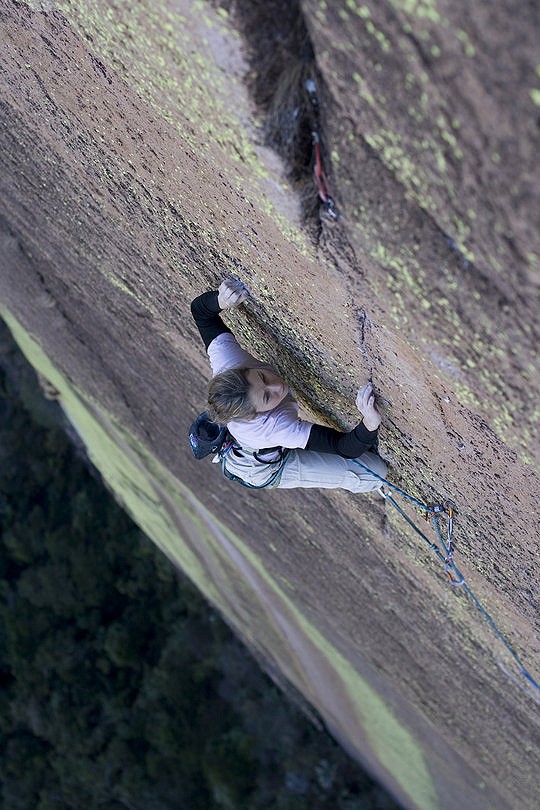
That comes perhaps from the course I have taken in life and is a personal choice because I’ve always preferred adventure to performance. That’s the message I want to pass on when I take our climbing workshops with Arnaud. To come back to the essential, to the pleasure of climbing. It doesn’t mean don’t have projects anymore but rather to learn to relativise.
It’s true that the media plays a role and that climbing is - little by little - becoming another sport entirely but I don’t think it’s a bad thing in essence. The advantage of climbing is that it has multiple facets.
In one period of life, a climber can frantically post their ticks on 8a.nu and in another, become more contemplative by travelling or by discovering big wall climbing, for example. In essence, it’s just the journey of life…there are moments for striving and moments for losing yourself!
How much of your climbing do you attribute to physical and mental aspects? - i.e. 50/50, 60/40 etc...
Ah, I’m terrible with figures !
I think it depends above all on the type of climbing you’re doing. When you’re trying a route at the crag, that could maybe be 70% physical against 30% mental as you greatly improve your chances of ticking the route with each try, if you know how to work a route correctly.
However, I remember the summer of 2009 in Rocklands. I had had numerous attempts in great conditions and each time I fell at the last hard move of Nutsa, an 8a. On the last day, before flying back home, it was so hot that I told myself I had no chance. The pressure dropped and I did the boulder on my first go. In that case it was more like 30/70 !
On the other hand, for onsight climbing the mental aspect will take up a bit more space as there are other parametres which come into play. Route reading, the capacity to keep a cool head and to change methods rather than getting wound up about it - so 50/50 maybe?
On a big wall, it’s different yet again. I remember that when I did Freerider on El Capitan, I was more troubled by the chimneys at grade 5 than by the small section of 7c on three crimps! That wasn’t difficult but the mental side counted a lot. Falling in a chimney isn’t recomended – we then come back to 30/70!
In climbing, the physical qualities are not enough to make a good climber. I recently re-read Lynn Hill’s autobiography and I really re-discovered some things in her approach which appeal to me. She talks of having a "soft grip" and "relaxed face" and of the fact that she learned, in training for The Nose in a day, to listen to her body and to climb intuitively. It’s a bit like what slab climbing made me feel.
You were very successful on the international competition scene, winning world cup events. What do you remember most about these years and what have you taken from these experiences?
It feels very far away, like another life! One of the biggest benefits for me was the training. Thanks to competitions, I almost became an accomplished sportswoman! I say "almost " because I never had the state of mind for it. I know that could sound odd for someone who won World Cups, but it’s the truth.
I also treasure the memory of meeting climbers with a great inner richness. There really was a great collective spirit at the events – with women such as Mariette Uhden, Martina Cufar, Muriel Sarkany, Liv Sansoz, Nathalie Richer and Elena Choumilova. The atmosphere was really nice and it was the same for the men, with very different climbers such as Elie Chevieux, Yuji Hirayama, Cristian Brenna, Christian Core, François Petit (Arnaud’s brother), the Bindhammer brothers or the 'young one' of the time – Chris Sharma. Of course, I can’t name everyone here but there are many others!
Another benefit of this period - you will think me very down to earth here – was the money! At the time, the sponsors didn’t give money to young climbers to help them travel. By winning competitions, Arnaud and I could go on trips that we had dreamt of. We climbed our first big wall in Madagascar in 1998, just before the summer competition season. Not really the best training but we didn’t care. I was 22 years-old and it was then that I really fell in love with big wall climbing.
"Climbing is an activity that can seem ungrateful if you focus on the result or just on your own sensations, as the moments of grace are quite rare in the end."
How would you describe your relationship with climbing?
Like a passionate, loving relationship, in which there are highs and sometimes lows but since I am faithful and constant in what I love, I know that it’s up to me to feed this relationship. By adjusting, for example, my desires in climbing to the possibilities of the moment. Climbing is an activity that can seem ungrateful if you focus on the result or just on your own feelings, as the moments of grace are quite rare in the end. From my perspective, throughout the years, I have become more attentive to everything that surrounds climbing. By exposing myself to the caress of the wind, to the birds circling, to the landscape, I take pleasure in climbing no matter what my form. I am no longer as demanding about the physical sensations of climbing as when I was 20 or 25 years-old, but on the other hand I have become terribly picky regarding the beauty of a line, its equipping or the quality of the rock. When I was younger I could climb on any route, today – it’s no longer possible !
How has your approach to climbing changed in recent years (if at all?)
I think there was a turning point for me in 2010. At this point in time I tried to return to climbing routes that were hard for me. In the summer, I was projecting two routes at once. I attempted the « Voie Petit » on the Grand Capucin (an 8b at 3500m) and returned to Ceüse two days afterwards to try L’Arcadémicien 8c. I was very close to succeeding on both routes but it was too much and in the end I exhausted myself and I failed on both of them! What’s more, it had snowed a lot in the Mont Blanc Massif which didn’t help me. I don’t know where this sudden ‘bulimia’ for climbing came from. Maybe because of a gap of six months the year before which we took off to build our house. I put myself under pressure because suddenly I had the feeling of being old at 35! I was really disappointed at the end of that summer, but the experience made me mature. I understood that the real failure was to no longer take pleasure at the end of the summer in climbing these routes that I loved.
That allowed me to realise once and for all that in being too inclined towards performance, I was diminishing my relationship with climbing and losing sight of the essential. I had already realised this in 2001, when I stopped competing, but this time my approach to climbing had changed radically.
However, this vision of high-level climbing as a "limitation" is a personal one and I really admire those who have the endurance and the patience necessary to invest themselves in the long term in extreme projects.
After this period I immediately rediscovered my enthusiasm by opening a multi-pitch route in the giant, magical cave of Getu during the Petzl RocTrip to China. I really had fun there as new-routing from the ground up is one of the aspects of climbing which I enjoy the most. To create an itinerary on a new piece of rock, it’s physically hard but really stimulating. However, in 2011 I was tired. The body often invents an injury to allow itself to rest. Mine chose a shoulder and the asthma that I have had since childhood got worse in one sudden hit. I almost spent a year being unable to climb.
In getting back into climbing afterwards, like a miracle my approach became calmer. The failure in our projects, injuries and illnesses are the best schools of life! I set myself the task of developing my yoga by doing a qualification which I am finishing just now and which has been very fulfilling.
"From Fanatic, I became simply "Amateur", in the traditional sense of the word in French, meaning one who does something just because they love it."
The experience of climbing Octogénèse in Corsica in 2012 came just after my setbacks and it was like a rebirth on the rock. Since then, there is no longer any obligation concerning climbing like before. I sometimes have days "of grace" as Arnaud says and I know to appreciate them, which came about in the Dolomites one summer. From Fanatic, I became simply "Amateur", in the traditional sense of the word in French, meaning one who does something just because they love it.
Does Arnaud share a similar outlook on climbing as you?
Arnaud is more regular in his motivation and training, and so he spends less time reflecting on things than me! He is lucky. At 44 years-old he sometimes still tries hard routes, however he matches me on one point – he isn’t capable of investing lots of time on one route (his all-time hero for this is Steve McClure!) Instead, he really likes opening new routes which doesn’t really correspond to performance.
You have travelled extensively alongside Arnaud, climbing new routes all over the world. What is it about discovering new climbs and areas that you enjoy?
Big wall routes and the big-walling life, that’s what I prefer. It's the playfulness of free climbing combined with the spice of the unknown when you open a route from the bottom-up. It also allows you to travel.
Which area/region of the world inspired/moved you the most?
I love Taghia, certainly for the climbing but mainly for the landscape and its people. We went there for the first time in 2002 and Arnaud and I return there each year. We have some very dear friends there.
Which climb stands out as the most memorable for you?
Climbing the Trango Tower in Pakistan in 2005. Eternal Flame, Kurt Albert’s and Wolfgang Güllich’s route is really one of the most beautiful climbs on one of the most beautiful summits that I know. There is everything. The altitude, the super bivouacs with an unbelievable panorama, the beauty of the line…
Next, Angel Falls in 2006, on the route which John and Anne Arran freed with a team of strong climbers. It’s the longest and the most memorable journey on a multipitch of my life. Almost two weeks, which were really not easy but which gave great memories that remain profound today.
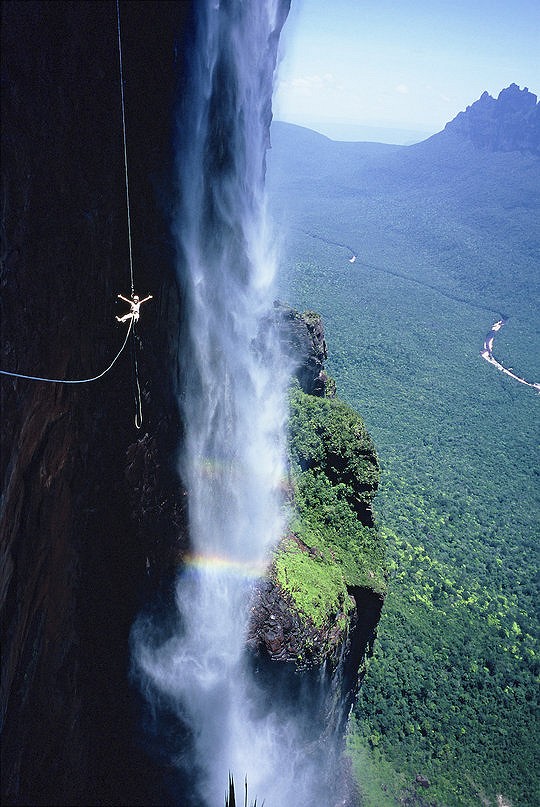
Freerider in 2007, also because I learned many things on this route. There are all sizes of crack and even if it’s never that extreme, it’s never easy either. The Monster Crack, an offwidth of 40m, required a big fight to complete it! Then there’s the first ascent of Babel in Taghia with our friends Nico Kalisz, Fred Gentet and Fred Ripert. We were very involved when opening it, really fighting between each bolt. I almost killed myself at the top by falling whilst hauling, so that’s also very memorable…
More recently in 2012 I loved opening a new route in Malaysia on Tioman Island on the Dragon Horns. There were five of us, a cosmopolitan team. We met there with David Kaszilkowski, Da Li Yong, a Chinese alpinist and Tam, a Malaysian climber. The route is amazing. The first pitch climbs up a tree and then it’s always around 6c. It’s also great to open routes which are accessible and can be shared with lots of other climbers! And the place is a total paradise…
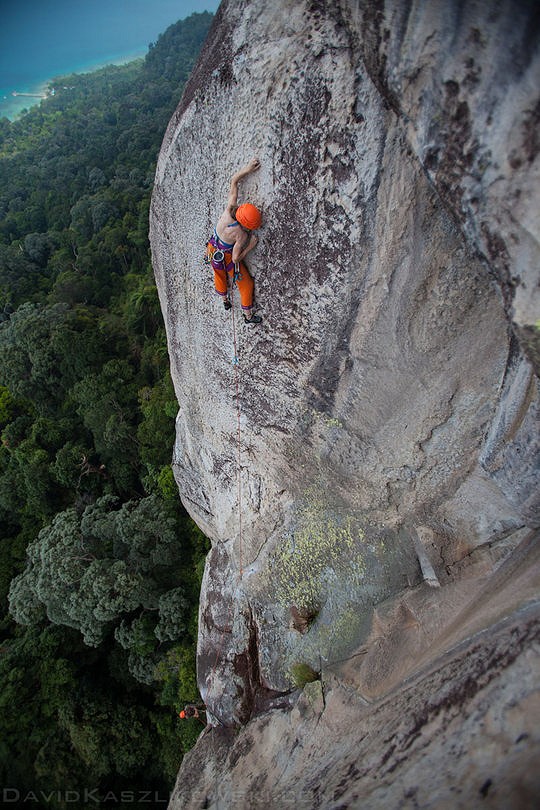
What are your future plans/goals?
I am currently finishing my yoga qualification and I’m writing a small book about my adventures with Arnaud.
Next, I would like to return to Taghia, the little Berber village, to open routes with some locals. We knew them as children when they were 8 or 10 years-old and today they are 20. They climb well and they would like to develop a little beginner’s site above the village to introduce Morrocans to climbing.
Describe yourself in three words!
Dreamy, loving and a chatterbox when it comes to writing!
Visit Stéphanie and Arnaud's website.
Stéphanie is sponsored by Petzl, Patagonia, La Sportiva and Totem.
Watch the video "Of the rock I asked for the moon" below:
- INTERVIEW: British Mountaineering Council CEO Paul Ratcliffe reflects on 2024 12 Feb
- INTERVIEW: Team GB Olympian Erin McNeice on her breakout 2024 season 11 Feb
- SKILLS: Push Your Grade: How to Climb Your First 7a Sport Route 6 Nov, 2024
- ARTICLE: Olympic Route Setter Garrett Gregor on Paris 2024 17 Sep, 2024
- ARTICLE: How did the Paris 2024 Olympic Games impact Sport Climbing Athletes' Instagram Followin 4 Sep, 2024
- ARTICLE: Meet the Paris 2024 Olympic Routesetters Part 3: Olga Niemiec, Boulder 4 Aug, 2024
- INTERVIEW: Meet the Paris 2024 Olympic Routesetters Part 2 - Martin Hammerer, Lead 1 Aug, 2024
- ARTICLE: Sport Climbing at Paris 2024: Schedule and How to Watch 30 Jul, 2024
- INTERVIEW: Meet the Paris 2024 Olympic Routesetting Team - Garrett Gregor 29 Jul, 2024
- INTERVIEW: GB Climbing Olympic Coach Rachel Carr on Paris 2024 24 Jul, 2024



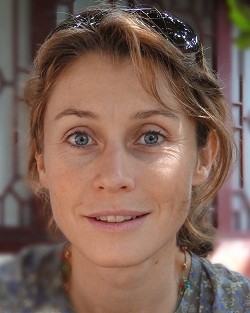









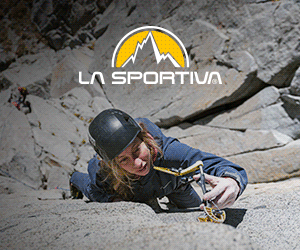











Comments